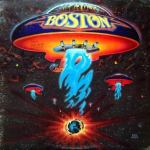Hot Stamper Albums with Huge Choruses
Albums with Choruses that Are Good for Testing
The multi-tracked layers of guitars really come to life on the better copies. The not-so-great pressings tend to be congested and compressed, thickening the sound and diffusing the layers of multi-tracked harmonies. Tom Scholz’s uniquely overdriven, distorted leads have near-perfect timbre. On the top copies you can really hear how much power that sound adds to the music.
As is the case for best pressings of Aqualung, when the guitar sounds this good, it really makes you sit up and take notice of the guy’s playing. When the sound works the music works, our seven word definition of a Hot Stamper.
Our killer copies have sweetness and tubey warmth we didn’t expect to hear. Better yet, the best copies have jump-out-of-the-speakers presence without being aggressive, no mean feat.
The good ones make you want to turn up the volume; the louder they get the better they sound. Try that with the average copy. When playing mass-market pop-rock music like this, more level usually means only one thing: bloody eardrums.
The typical Boston EQ is radio-friendly, not audiophile-friendly. But some were cut right, with the kind of richness, sweetness and smoothness that we fondly refer to here at Better Records as The Sound of Analog.
Choruses Are Key
The production techniques used on the late Brad Delp’s powerful vocals had to be implemented with the utmost skill and care or they would never have made the album the smash success that it is. His vocals are one of the great strengths of the album. You can be sure the producers and engineers knew that they had a very special singer in Brad and lavished their time and energy on getting his voice just right in the mix, making use of plenty of roomy analog reverb around both his multi-tracked leads and the background harmonies as well.
After hearing plenty of copies, one thing became clear — if the vocals don’t have good presence and breathy texture, you might as well be listening to the radio. Toss it onto the trade-in pile and move on. Brad really belts out those high notes; the right blend of clarity and weight is what lets his soaring vocals work their chart-topping magic.
The richness, sweetness and freedom from artificiality is most apparent on Boston where you most always hear it on a pop record: in the biggest, loudest, densest, most climactic choruses.
We set the playback volume so that the loudest parts of the record are as huge and powerful as they can possibly grow to be without crossing the line into distortion or congestion. On some records, Dark Side of the Moon comes instantly to mind, the guitar solos on Money are the loudest thing on the record. On Breakfast in America the sax toward the end of The Logical Song is the biggest and loudest sound on the record, louder even than Roger Hodgson’s near-hysterical multi-tracked screaming “Who I am” about three quarters of the way through. Those, however, are clearly exceptions to the rule. Most of the time it’s the final chorus that gets bigger and louder than anything else.
Blasting the Wall of Sound
A pop song is usually structured so as to build more and more strength as it works its way through its verses and choruses, past the bridge, coming back around to make one final push, releasing all its energy in the final chorus, the climax of the song. On a good recording — one with real dynamics — that part should be very loud and very powerful.
It’s almost always the toughest test for a pop record, and it’s the main reason we play our records loud. The copies that hold up through the final choruses of their album’s largest scaled productions are the ones that provide the biggest thrills and the most emotionally powerful musical experiences one can have. Our Top 100 is full of the kinds of records that reward that listening at loud levels.
We live for that sound here at Better Records. It’s what vintage analog pressings do so brilliantly. They do it so much better than any other medium that there is really no comparison and certainly no substitute. If you’re on this site you probably already know that.
